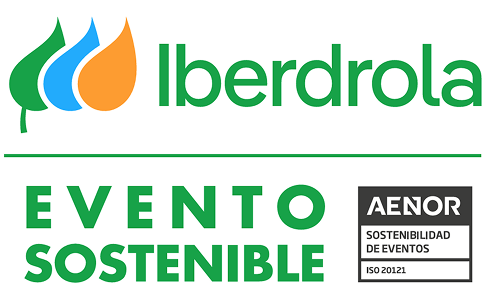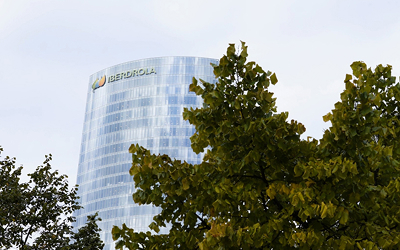Sustainable event management
We are pioneers in sustainable event management
Iberdrola has extended its Sustainable Event Management System to include ISO 20121 certification for its Results Presentations and Capital Markets Day, having been a pioneer in 2016 by obtaining the AENOR seal for its Shareholders' Meeting.

As a sign of our commitment to sustainability and continuous improvement, in 2024, we have adapted our sustainable events management system to the new version of the ISO 20121:2024 standard. The Spanish Association for Standardisation and Certification (AENOR) has awarded ISO 20121:2024 Sustainable Events certification [PDF] External link, opens in new window. to Iberdrola's General Shareholders' Meeting, Results Presentations and Capital Markets Day. In this way, the company becomes the first IBEX 35 company to have these corporate events certified by AENOR under the new version of the ISO 20121:2024 certification.
This acknowledgement attests to the fact that Iberdrola's events maximise positive impacts in the areas of sustainability, since they integrate social responsibility, environmental protection and economic development. Furthermore, this certification is in line with the company's Iberdrola's Sustainable Development Policy, which establishes that the group's events must strictly comply with all applicable requirements as well as promoting accessibility, inclusion and non-discrimination in their planning and execution.
Iberdrola was already a pioneer in 2016, being the first IBEX 35 company and the first electricity company among the ten largest in the world to obtain the AENOR standardisation body's seal for Sustainable Event Management Systems, which encompasses the most relevant events for the company's Stakeholder Group Shareholders and Financial Community. Now, it is once again certifying its main corporate events under the same management system.
What is a sustainable event?
A sustainable event is one that maximises, within the entire scope thereof, the positive impacts in the three areas that sustainability covers: economic, social and environmental.
Iberdrola seeks the engagement of all its Stakeholders and takes into account their needs and expectations in order to achieve the continuous improvement of its event sustainability management system in collaboration with its suppliers and the value chain. Through this system, we work to ensure that our major corporate events generate economic, social and environmental benefits for the community.
What is standard ISO 20121?
All events of any kind have an environmental, economic and social impact on the communities in which they are held. On the positive side, the most notable impact of an event is its contribution to the local economy. However, the downside is the high energy and water consumption that this type of events involve, as well as the vast quantities of waste generated by the organisation and attendees.
To tackle this problem, on 15 June 2012 — with the London Olympic Games just around the corner — the world's largest international standards body, the International Organization for Standardization (ISO), issued ISO 20121:2012: Event sustainability management systems. This voluntary standard was created to help events organisers to improve the sustainability of their events across all stages: design, planning, execution, implementation, review and follow-up activities after the sustainable event.
The purpose of this standard is not to certify the event itself, but the management system of the company that organises the event in order to ensure that it is carried out according to sustainability criteria. When awarding the certification, ISO verifies that a company's event management system is efficient and has been designed in accordance with the ISO 20121 standard.
Benefits of ISO 20121 certification
The benefits inherent in ISO 20121 certification include:
How do we make our events more sustainable?
We work on the three pillars of sustainability: social, economic and environmental. To this end, we set ourselves guidelines and objectives to ensure that the impacts of our events are as beneficial as possible year after year. Within these objectives, we propose accessibility, environmental, awareness-raising and participation actions, and support for the local community.
Depending on the event, the target audience and the purpose of the event, the most appropriate sustainability actions are defined. These include the following:
Improving accessibility
- Multi language
- Live broadcast
- Promoting remote participation
- 100% accessible location
- Sign language, subtitling and audio description
Minimising environmental impact
- Green purchasing criteria
- Reuse of materials
- Segregation and re-evaluation of waste
- Emissions offset project
Raising awareness of sustainability issue
- Traction to main suppliers
- Analysis and communication of the environmental impact of events
- Awareness-raising for suppliers and event participants
- Communication campaigns aimed at employees
Supporting the local community
- Promoting young people's entry into the labour market
- Encouraging equal recruitment of staff
Ways of reinforcing the sustainability of our events

Responsible waste management
Waste segregation during set-up, dismantling and running of the event.

Low consumption technology
Use of energy-efficient labelled equipment.

Re-use and recycling
Sustainable water packaging distribution and re-use of 100% of the furniture.

Responsible waste management
Waste segregation during set-up, dismantling and running of the event.

Low consumption technology
Use of energy-efficient labelled equipment.

Re-use and recycling
Sustainable water packaging distribution and re-use of 100% of the furniture.
Carbon footprint of 2024 events
We work to reduce the carbon footprint (1) of our corporate events.
(1) The carbon footprint measures the amount of CO2 emissions - and other greenhouse gases - equivalent to the eect caused by an event, directly or indirectly, on global warming. These gases include methane (CH4), nitrous oxide (N2O), hydrofluorocarbons (HFCs) and carbon dioxide (CO2). To account for the footprint, the unit of measurement CO2 equivalent (CO2 eq) is established, which is equivalent to the emission of all greenhouse gases mentioned above.
Our sustainable events
If you have any doubts, queries or suggestions about our sustainable event management activities, please contact us at sustainable.events@iberdrola.com























